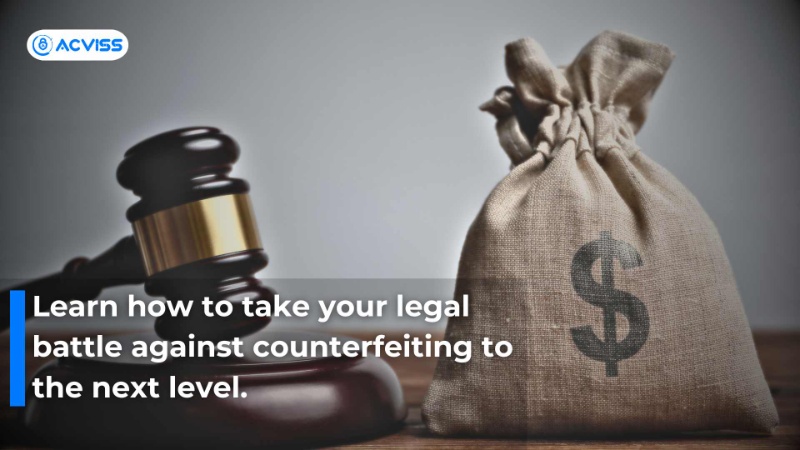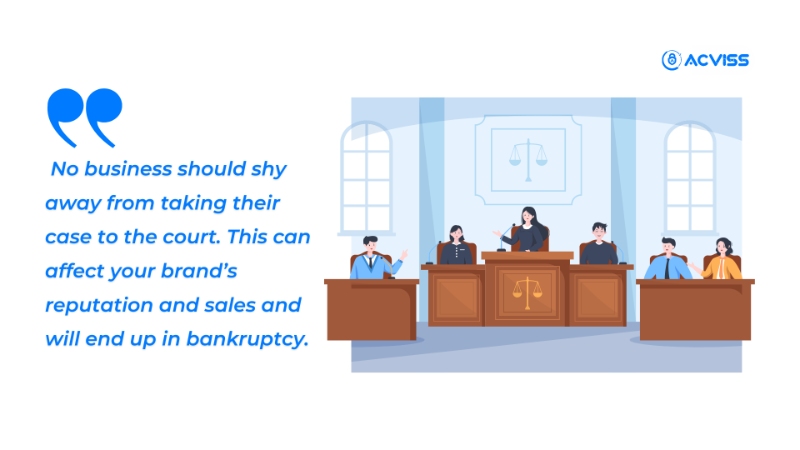Elevate Your Legal Battle Against Counterfeiters With These Strategies

Counterfeiting is no news to businesses and every brand has had its fair share of fights against them. This menace has become a serious threat to not only keeping the economy alive but endangering the daily life of ordinary citizens. To give you an idea of what counterfeiting is, it refers to the production and sale of fake goods that infringe on the intellectual property rights of the original owners. Recent years have witnessed a drastic increase in the rate of counterfeiting across the world and the trouble it has caused is numbered in trillions. And hence the digit of legal suits against counterfeiters for infringing Intellectual property rights has also been at an all-time high. But not every brand, especially small-scale businesses know its path around the legal battle. And today we come especially with the thought of educating you about how to excel in legal action against counterfeits.
What is a Counterfeit Lawsuit?
A counterfeit lawsuit is a legal action taken by a brand owner against a person or a business that is producing or selling fake goods. The lawsuit seeks to stop the production and sale of counterfeit goods and to seek damages for the harm caused to the brand owner. In 2021, American athletic wear company, New Balance filed a lawsuit against its counterfeiters in China and got damages worth $3 million. Similarly, Canon filed an IP lawsuit against 52 counterfeiters in 2022 and the counterfeiters agreed to stop selling products infringing Canon’s trademark. So, lawsuits are powerful enough to uproot counterfeiters and they can be filed under various legal theories, including trademark infringement and copyright infringement.
Trademark infringement is the most common legal theory used in counterfeit lawsuits. A trademark is a symbol, word or phrase that identifies and distinguishes the source of goods or services of one party from those of others. If a person or entity uses a trademark that is similar or identical to a registered trademark of a brand owner, it can lead to confusion among consumers and harm the reputation of the brand.
On the other hand, copyright infringement occurs when a person or entity reproduces, distributes or displays a copyrighted work without the permission of the copyright owner. This can include counterfeit copies of books, movies, music and other creative works.
How can Businesses file a lawsuit against counterfeiters?
A legal battle is the best way of getting rid of the counterfeit parasite. If you suspect that your brand’s intellectual property rights are being infringed upon by the production and sale of counterfeit goods, you can file a lawsuit to protect its rights. You can follow the steps given below to find out how to move forward legally.
Evidence
Gather as much evidence as possible to show that the goods are counterfeit, including photographs, receipts and packaging. Acviss's Truviss employs AI and Machine learning tools to scan the internet and social media to find products and ads that use your trademark and patents. This can help you trace your counterfeiters and the evidence collected will support the case in court. The more similarity between the products, the stronger the case becomes.
Send a letter
Before getting to the court, it is better to send a cease and desist letter to the individual or company producing or selling the counterfeit goods. This letter will inform the recipient that your brand has intellectual property rights that are being infringed upon and request that they stop producing or selling counterfeit goods. Most counterfeiters may stop their sale upon receiving the such letter as a majority are unaware of the legal side of counterfeiting products.
Hire a Lawyer
To fight a legal battle, you need an expert in the field. Hire a lawyer who specialises in intellectual property law. The lawyer will help the business evaluate its case, prepare legal documents, and represent them in court.
Move a lawsuit
Upon consulting with your lawyer, you can file a lawsuit seeking damages for the harm caused by the sale of counterfeit goods or your lawyer would do that for you. The lawsuit should clearly state the evidence you have collected before and mention the counterfeiters specifically.
Attend hearings
It is essential for you or someone from your company, to represent you in court. Attend court hearings as required and provide evidence to support the case.
Negotiation and Settlement
If the defendant is willing to settle the case, your lawyer will negotiate a settlement agreement that compensates the business for the harm caused by the sale of counterfeit goods.

Your Brand Benefits From It!
Lawsuits can solve half of the damages counterfeiters have incurred for you. The main benefit of filing a lawsuit is the protection of the business's intellectual property rights. The lawsuit can stop the production and sale of counterfeit goods, which can harm the business's reputation and profits. Filing a lawsuit can also deter other individuals or companies from producing or selling fakes, which can reduce the overall impact of counterfeiting on the business and the industry as a whole.
Another benefit is the potential for financial compensation. Your business can seek damages for the harm caused by the sale of counterfeit goods, which can include lost profits and harm to the brand's reputation. The damages awarded can help your business recover from the pit the counterfeiters dug for you.
In addition to protecting intellectual property rights and seeking compensation, filing a counterfeit lawsuit can also send a message that your business takes counterfeiting seriously and is willing to take legal action to protect its rights. This can enhance your brand's reputation and deter others from infringing on your intellectual property rights in the future.
Should You Opt For A Lawsuit?
Of course, no business should shy away from taking their case to the court. This can affect your brand’s reputation and sales and will end up in bankruptcy. But lawsuits are not the only way to fight your counterfeiters. You can make your brand equip the latest anti-counterfeit technology to keep you away from the counterfeit market. Acviss’s Truviss employs AI and Machine learning algorithms, which act as a silent guardian for your brand, protecting you from potential infringement over the online marketplaces. Giving you an upper hand in the fight against counterfeits.
Can an Ordinary Citizen File a Counterfeit Lawsuit?
If you are an ordinary citizen who has been harmed by the sale of counterfeit goods, you may be able to file a counterfeit lawsuit. However, it is important to note that the process can be complex and expensive, and it is recommended to consult with a qualified lawyer who specializes in IP law.
In Conclusion
Yes, filing a counterfeit lawsuit is an expensive and tedious task but it is not without benefits. It can regain the reputation and financial losses your brand lost during the period. And more importantly, it will give a notion to your customers that you are willing to go to any extent to protect your product and safeguard their interests. This can improve your customer’s trust and loyalty towards you. Creating an engaging and loyal audience for you to build your brand. So, if you suspect that your brand's intellectual property rights are being infringed upon, you should immediately consult with a qualified lawyer who specializes in IP law and take the necessary legal steps to protect its rights.